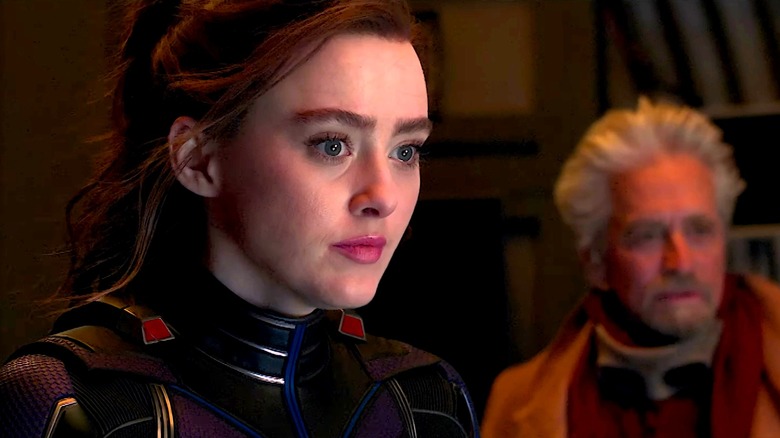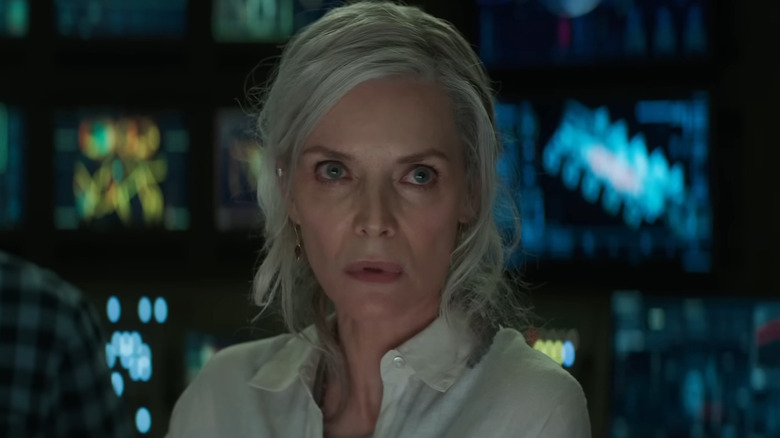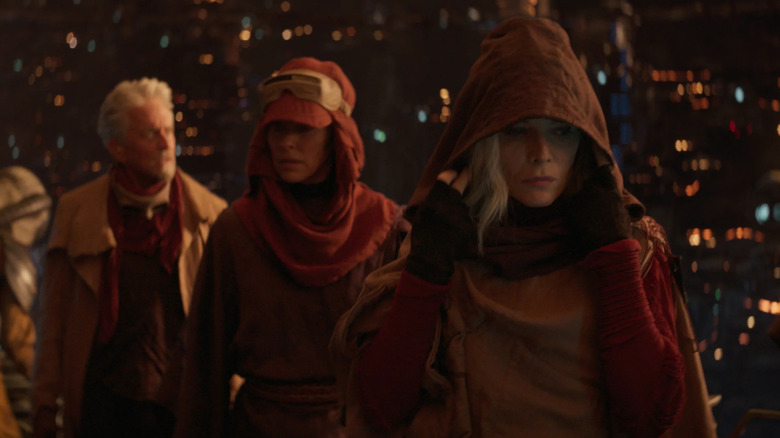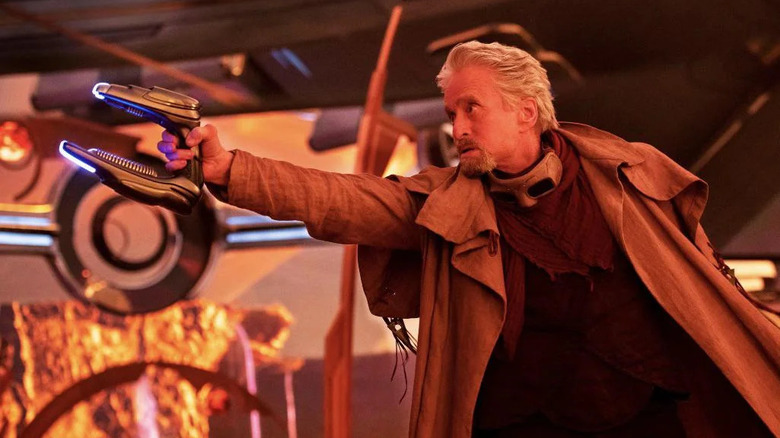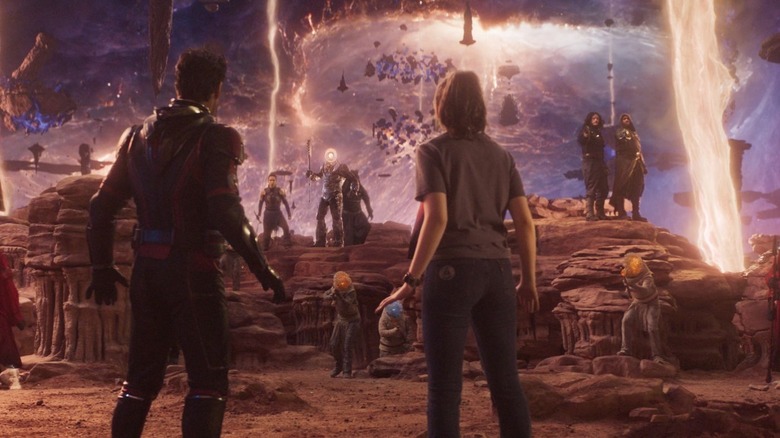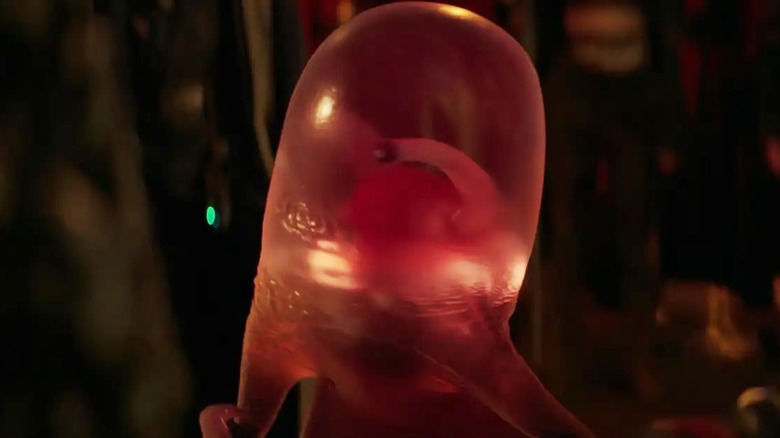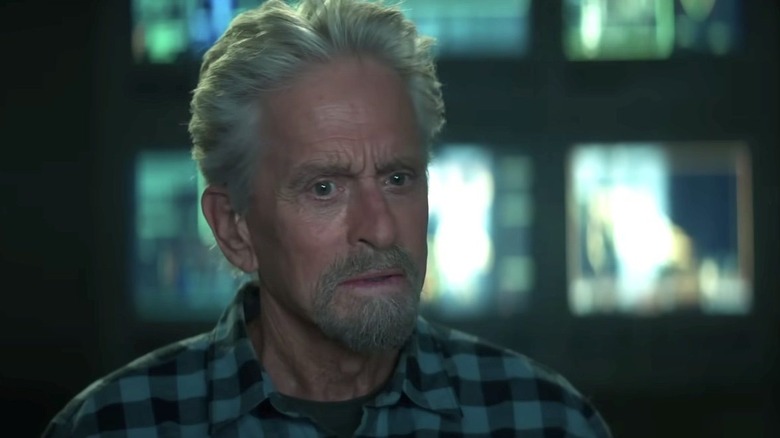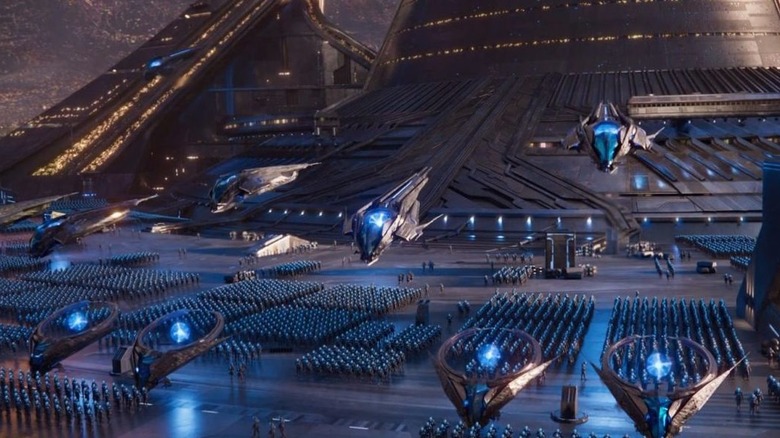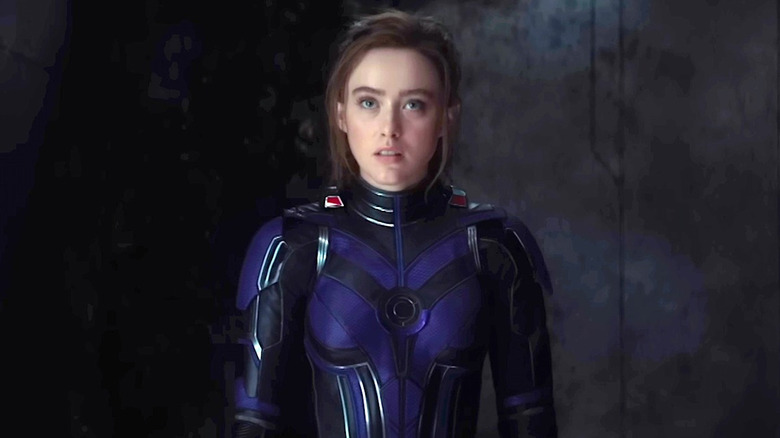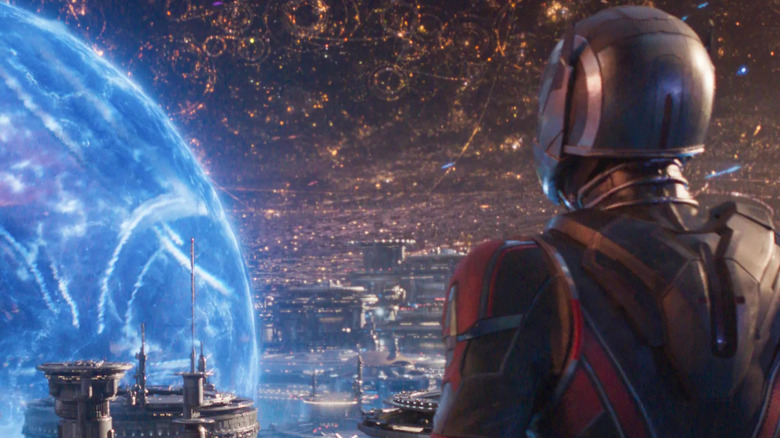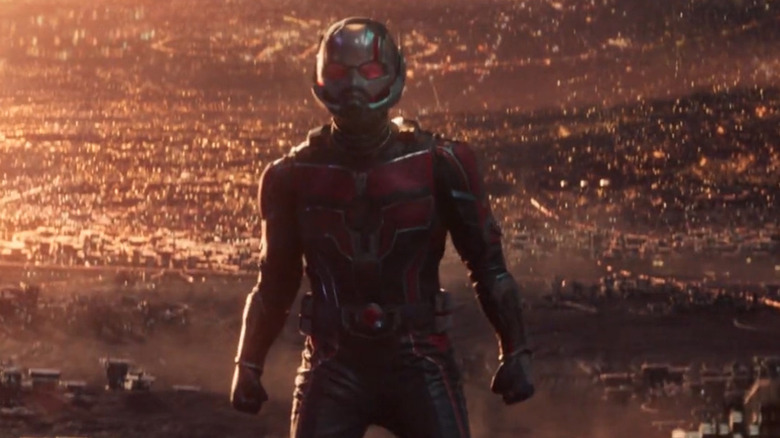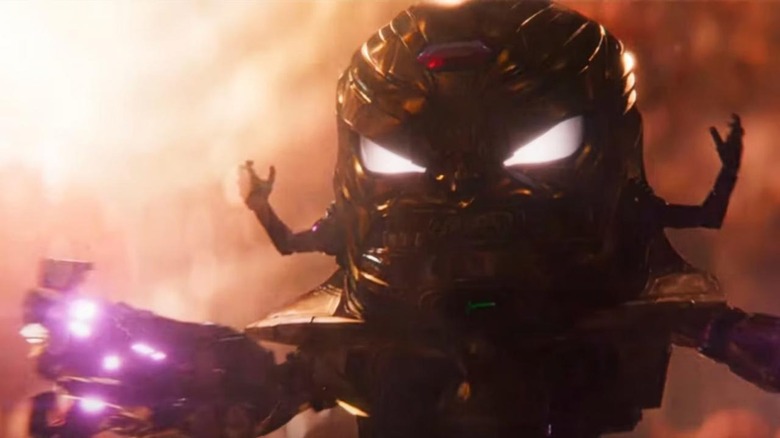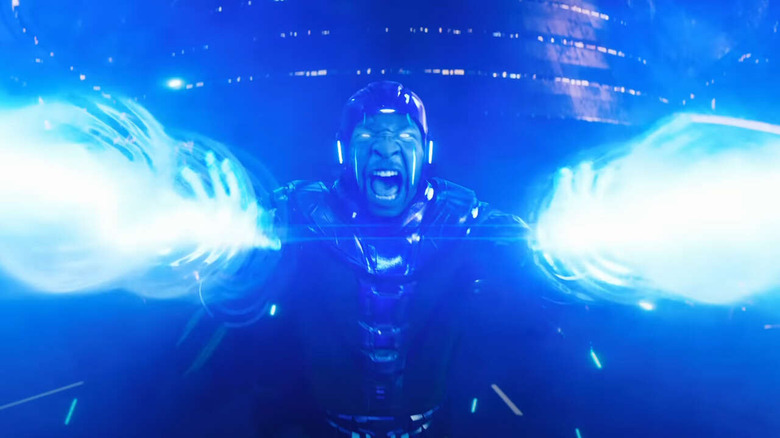Dumb Things In Ant-Man 3 That Everyone Just Ignored
"Ant-Man and the Wasp: Quantumania" has been fully criticized by critics and overtly lauded by fans. In fact, while the third "Ant-Man" movie is struggling with critics on Rotten Tomatoes, audiences have flocked to see it in theaters and the film is on track to beat its predecessors at the box office. The extreme reception is well warranted, as the third installment of Scott Lang's titular franchise — not to mention Hope Van Dyn's, who also deserves title-character treatment — is both fun and frustrating. This odd dichotomy is wrapped up in a big ball of CGI-driven quantum chaos that leaves much to be desired.
Love it or not, the truth is, just like every MCU outing, "Ant-Man and the Wasp: Quantumania" definitely has some dumb stuff viewers have to look past as they watch. It's a natural development that comes from weaving 30-plus films into the same cinematic universe. From gaping plot holes to the excessive use of linguistic cognition juice, here are a few of the dumbest things that we all had to sit through in "Ant-Man and the Wasp: Quantumania."
Janet's Quantum Realm woes
"Ant-Man and the Wasp: Quantumania" doesn't waste time before it dives headlong into the Quantum Realm. However, in those spares minutes before everyone goes subatomic, there are a few important developments that take place. We hear about Scott Lang's post "Avengers: Endgame" life as a book writer and acclaimed bug hero. We see Cassie in prison for her vigilante actions — instincts that she pretty clearly inherited from her father. We also catch up with Dr. Hank Pym and Janet van Dyne as they get used to life together again after a 30-year hiatus.
This quick round of catch-up eventually leads us to the basement, where we hear about Cassie and Hank's experiments with sending signals down into the Quantum Realm. This leads to two particularly dumb things right off the bat. The first is Janet's very legitimate protest about why she hadn't been included in the project because, well, she has three freaking decades of experience living down there! It's an extremely valid point. How on Earth has Hank not grilled her about all things quantum yet? How did Cassie settle for grandpa's brief experience instead of asking her grandmother to share her wealth of knowledge?
The kicker is that Janet gets panicky about a signal going down into the Quantum Realm and misses — by a matter of seconds — her opportunity to stop Kang from responding. The paranoia makes sense, considering the threat, but where was it the first time we met Janet in "Ant-Man and the Wasp"? The whole thing is a little hard to swallow.
Getting out of the Quantum Realm? Piece of cake.
Janet Van Dyne is a genius. Hank Pym knows a lot about ants and small sciency stuff. Together, the dynamic power couple is unstoppable, regardless of if you're talking about their scientific acumen or their heroic prowess. However, there are a few points in the story when even their tremendous intellectual stature borders on ludicrous.
Take, for instance, Janet's casual approach to returning to the surface world (if we can call it that). Throughout the earlier portions of the movie, Janet is focused on finding her son and granddaughter. Her plan after that is to zip on home by — doing what exactly? Remember, we see later that Kang and Janet work for quite a while on restoring just the power source for the Conqueror's ship. Janet doesn't appear to get much experience observing the ship in all of its advanced scientific splendor. It's a bit of a leap to assume she would know how it could help her leave the Quantum Realm for greener pastures.
Eventually, our heroes are able to use the film's MacGuffin — er, Kang's wonderfully equipped vessel and its engine — to quickly construct a portal straight back to where they need to go. Still, by this point, the Conqueror's tech has already been described as far superior to anything humans have ever created. How does Janet know how to create portals to specific points in time and space lickety-split, just like that? The whole thing involves a little too much suspension of disbelief for our liking.
Drink up! And hear me better, man.
The way movies handle cross-cultural barriers to communication is always interesting. Some opt to stay authentic and lean on subtitles or dubbing. Others ignore reality and have everyone just speak in a single language. "Ant-Man and the Wasp: Quantumania" does neither. Instead, the movie has each person go through the process of drinking an interesting linguistic cognition juice apparently secreted from a creature called Veb.
This makes it easier for viewers to understand the story without ignoring the multiple languages element, but what on earth is up with the tool they use to do it? Even though it makes for a few laughs, particularly when Lang is ceremoniously doused in the dialect nectar, the process is so dumb it begs the question of why bothering to introduce it in the first place. Besides, when Hope, Hank, and Janet go to get some of the lingo juice, they order it at a bar without so much as inquiring about the check. The introduction of the solution is as confusing as the original problem itself. You know what we call that? Dumb.
Actually, it is your fault, now that I think of it
Once the main cast is sucked into the Quantum Realm, it doesn't take long before the plot begins to thicken. Scott and Cassie quickly find themselves amongst the tribal dwellers of the region, and they have a chance to catch their breath. At this point, Cassie begins to verbally process what happened, and she starts to blame herself and says that the entire debacle is all her fault.
Scott's response to this is to console his daughter, which — for the record — is totally appropriate and makes sense. However, he goes one step further by specifically stating that it isn't her fault. Hang on a second, though! Cassie's impetuous desire to help others without counting the cost and her reckless tinkering in the Quantum Realm directly led to the situation unfolding. So — it kinda is her fault, right? That doesn't mean her dad has to rub her face in it, but the fact that he blatantly and unconvincingly lies to her is just kind of dumb.
I have HOLES!
Veb is a funny blob of a character that provides a unique sense of comic relief, even in a franchise known for having plenty of humorous interactions. His obsession with creatures' holes is particularly entertaining, even though it borders on the ridiculous by the end. In fact, if you think about it just a little bit, even his first interaction with Scott Lang is kind of dumb.
When Veb first talks to Scott, he's intrigued by the number of human holes the otherworldly intruder has. He's blown away by the human's septet of apertures, even though he can see five of them in plain sight. It's also worth pointing out that the prophetic Quaz, the fierce Jentorra, and others that he clearly already knows are also sporting five holes a piece, even if they're not humans. Why the shock and awe?
By the end, Veb is shot full of holes, causing him to respond with morbid glee that "I have holes!" before he uses them to consume several of Kang's faceless minions on the spot. The recurring perforation pun is fun at first, but by the end, it's overplayed and just as awkward as it is entertaining.
A class two civilization. What the heck?
One of the science projects that we see in the basement before everyone heads down to the Quantum Realm early in the movie is a hyper-advanced ant farm. The glass-sided wonder reveals ants industriously acting in ways that only Hank Pym's insectoid friends ever could. When Kang brings everyone down for a visit, the ants are included in the chaos and are briefly shown before they suddenly disappear.
Fast forward a bit, and Hank Pym, who's been hearing things for a while, discovers that his six-legged friends have returned just in time to save the day. Not only that — they're also hyper-advanced creatures now, having spent thousands of years developing a Quantum Realm civilization that Hank casually refers to as a "class two civilization." For those familiar with the Kardashev scale (which we assume the scientist is referring to here), this doesn't just mean the ants have evolved a bit. It means that they've become capable of harnessing and controlling a star or whatever equivalent power source they're using in the Quantum Realm.
For comparison, humans aren't even a Class I civilization yet. In fact, we're not even close. So, we're expected to believe that the ants are that advanced in that short of a time? We believe they're impressive, extraordinary superhero-level creatures, but a Class II civilization in a few thousand years? Yeah — no.
The dumbest guards ever
It's a standard story trope to create an army of faceless minions that the audience can root against without the need to attach any ethical weight to the situation. "Star Wars" does it with clone troopers. Tolkien does it with Orcs. War movies do it all the time. In "Ant-Man and the Wasp: Quantumania," we get it yet again. Kang's armies are literally faceless, equivalently-sized beings that get trashed from one end of the film to the other without a second thought. Thank you, Hollywood.
Kang's Quantum soldiery is also particularly dumb, as is revealed as the film progresses. Case in point — when Cassie Lang is captured, we see her being escorted by a pair of soldiers. Suddenly, we get a glimpse of the soon-to-be Stature's hands, and we see that she's holding Pym Particle discs, which she promptly uses to dispose of her captors a moment later. The fact that Cassie could just pull these out and use them against unsuspecting guards is about as dumb as it gets. Did they not check her for weapons? Did they not restrain her with handcuffs or some kind of equivalent?
Sometimes the use of a scene to advance the plot in "Ant-Man and the Wasp: Quantumania" is so obvious it hurts — even more than it hurts Kang's automatons.
Who needs those masks, anyway?
Superhero movies have a serious mask issue, and the MCU suffers from the problem more than most places. It's a world where no one can keep their secrets — unless it's Peter Parker literally asking Dr. Strange to cast a spell to make the entire world forget him. This means everyone is constantly and casually pulling off their masks for dramatic effects, and "Ant-Man and the Wasp: Quantumania" is no exception.
Throughout the movie, masks fly on and off within seconds of danger. Scott and Hope pop their masks on, throw a few punches, and flick them off, even though they're still in the thick of the fight. Kang behaves similarly.
Perhaps the dumbest example of them all, though, is during Cassie's fight with Darren Cross' MODOK. Both are masked characters, with the latter sporting a particularly intimidating and impressive layer of facial protection. In their climactic fight, Cassie finds herself on the edge of a cliff, about to receive a knock-out blow. Her choice at this crucial moment? To take off her mask. Her opponent isn't immune to this either. There are numerous scenes where MODOK flips up his very safe helmet to smack talk, have a conversation, and monologue throughout the movie.
We all know why filmmakers do this — the creators want us to see the actors actually acting. Still, it doesn't change the fact that it can feel really dumb as the headgear flits on and off over and over again throughout each scene.
Does the Giant-Man persona have no effect on Scott Lang anymore?
When Scott Lang goes big, he can do a lot of stuff in his Giant-Man persona. The dumb issue on trial here is the lack of consistency with the effect that Lang's giant escapades have on the hero himself.
The first time we see Lang go big, it's at the airport in Germany in "Captain America: Civil War." In that situation, Scott warns of the inconsistent and unknown effect of the move. In that case, it all turns out okay, house arrest aside. In the second "Ant-Man" flick, Lang becomes gigantic again, only to be overwhelmed by the sheer exhaustion and physical toll the act has on his body. This isn't just a passing action, either — he faints in the water, and Hope has to go and rescue him before he drowns. We see Scott turn into Giant-Man in "Avengers: Endgame," too. Apparently, with little to no effect this time.
In "Ant-Man and the Wasp: Quantumania," this growing disregard for the consequences of becoming Giant-Man gets even worse. Scott is constantly flitting in and out of giant mode, apparently with no effect on his stamina. Maybe Hank Pym performed some kind of upgrade between now and the second "Ant-Man" film and when he is snapped away in its credit scene? But if so, we haven't heard about it. So, what is it, Scott? Does it affect you or not? The inconsistencies are piling up here.
Apparently, collateral damage is still a-okay in the MCU
The issues of collateral damage and the unwanted side effects of superhero work were a big issue during "Avengers: Age of Ultron" and other films way back in Phase 2 and Phase 3. The MCU and its creators openly wrestled on the screen with the issue of supers accidentally hurting others and what kind of rules, restrictions, and consequences should be associated with those kinds of incidents.
Yet here we are, kicking off Phase 5, and collateral damage has once again become a mindless, virtually unnoticed part of superhero work. What are we talking about? Why, Scott Lang's ferocious entrance into Kang's capital city of Chronopolis during the climax of the film, of course.
As the Avenger storms into the urban center, he's heard angrily taunting Kang as he kicks and smashes buildings to kingdom come. The only problem? Very real, living, and breathing Quantum Realm dwellers are inhabiting those structures, and presumably, they don't all consist of the blue-faced imbeciles that make up Kang's army. Remember, the Quantum Realm has a wide variety of inhabitants, each with their own consciousnesses. At least, they do until Scott heartlessly destroys them in his Giant-Man rampage. Maybe we'll be getting the Quantum Realm equivalent of the Sokovia Accords in "Ant-Man 4."
MODOK's death is dumb in more ways than one
MODOK was a fun twist tossed into a busy plot. Bringing back Darren Cross' mangled villainous corpse in the form of the Mental Organism Designed Only for Killing was funny, entertaining, and just a little bit unsettling — but isn't that always the way with MODOK? Still, finally bringing the character into the MCU was fun, right up until they stole him away less than two hours later.
MODOK's entire death scene was strange. It was dripping with humor as he stroked Scott's face, called him a brother, and announced, "My name is Darren, and I am not a d***!" It also ended with the hero's redemption before we even had a chance to really get emotionally invested in his current state of existence. Rushing the rehabilitation and death of a character that quickly felt hasty and unsatisfying. It lacked the gravitas of other MCU deaths, and at the end of the day, it just felt unnecessary. In that sense, it was dumbness defined.
Everyone survives Kang because, well, of course they do
The MCU has been accused of struggling to let go of heroes in the past. It's a debatable point and one that has examples for both sides of the argument. When it comes to "Ant-Man and the Wasp: Quantumania," let's just say it definitely falls into the "can't let anyone die" side of the ledger. In fact, the movie manages to kill off two villains without sacrificing a single hero.
None of these deaths matter much anymore with the multiverse in play. Yet, the unwillingness to write in a character death, even within a single story, is ridiculous. Kang is incredibly powerful, and Ant-Man and his crew are, well, let's just say they aren't Scarlet Witch or Captain Marvel.
Besides, the movie opened up a couple of opportunities to kill a hero or two in very meaningful ways. Hank Pym is an obvious candidate. The aging original Ant-Man is in the retired stage of his career, both as a hero and a scientist. Giving him a chance to die saving the universe from Kang would have been a satisfying end to an MCU great.
Janet is another option. The story of "Quantumania" reveals how heroic Janet already has been in the history of that realm. Giving her a chance to complete her heroism by sacrificing herself to stop Kang a second time would have been powerful. Instead, MODOK was introduced and bumped off, and Kang died even though we know we're going to see him again. Oh well.
